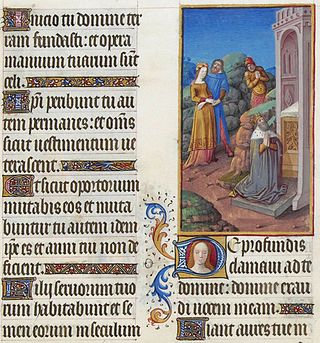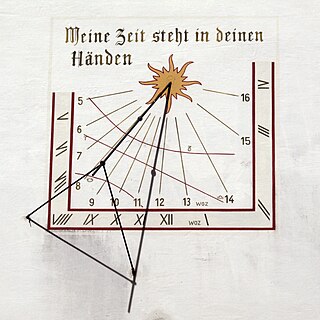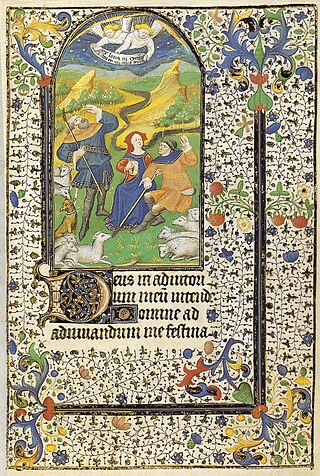Related Research Articles

Sir John Milford Rutter is an English composer, conductor, editor, arranger, and record producer, mainly of choral music.

Gabriel Fauré composed his Requiem in D minor, Op. 48, between 1887 and 1890. The choral-orchestral setting of the shortened Catholic Mass for the Dead in Latin is the best-known of his large works. Its focus is on eternal rest and consolation. Fauré's reasons for composing the work are unclear, but do not appear to have had anything to do with the death of his parents in the mid-1880s. He composed the work in the late 1880s and revised it in the 1890s, finishing it in 1900.

Chichester Psalms is an extended choral composition in three movements by Leonard Bernstein for boy treble or countertenor, choir and orchestra. The text was arranged by the composer from the Book of Psalms in the original Hebrew. Part 1 uses Psalms 100 and 108, Part 2 uses 2 and 23, and Part 3 uses 131 and 133. Bernstein scored the work for a reduced orchestra, but also made a version for an even smaller ensemble of organ, one harp, and percussion.

Psalm 23 is the 23rd psalm of the Book of Psalms, beginning in English in the King James Version: "The Lord is my shepherd". In Latin, it is known by the incipit, "Dominus regit me". The Book of Psalms is part of the third section of the Hebrew Bible, and a book of the Christian Old Testament. In the slightly different numbering system used in the Greek Septuagint and Latin Vulgate translations of the Bible, this psalm is Psalm 22.

John Rutter's Requiem is a musical setting of parts of the Latin Requiem with added psalms and biblical verses in English, completed in 1985. It is scored for soprano, mixed choir and orchestra or chamber ensemble.

Psalm 130 is the 130th psalm of the Book of Psalms, one of the penitential psalms and one of 15 psalms that begin with the words "A song of ascents". The first verse is a call to God in deep sorrow, from "out of the depths" or "out of the deep", as it is translated in the King James Version of the Bible and the Coverdale translation, respectively. In Latin, it is known as De profundis.

Psalm 13 is the 13th psalm of the Book of Psalms, beginning in English in the King James Version (KJV): "How long, O Lord". The Book of Psalms is part of the third section of the Hebrew Bible, and a book of the Christian Old Testament. In the Greek Septuagint and the Latin Vulgate, this psalm is Psalm 12 in a slightly different numbering system. In Latin, it is known as "Usquequo Domine".

Psalm 31 is the 31st psalm of the Book of Psalms, beginning in English in the King James Version: "In thee, O LORD, do I put my trust". In Latin, it is known as "In te Domine speravi". The Book of Psalms is part of the third section of the Hebrew Bible, and a book of the Christian Old Testament. In the slightly different numbering system used in the Greek Septuagint version of the Bible, and in its Latin translation, the Vulgate, this psalm is Psalm 30. The first verse in the Hebrew text indicates that it was composed by David.

Psalm 47 is the 47th psalm of the Book of Psalms, beginning in English in the King James Version: "O clap your hands". The Book of Psalms is the third section of the Hebrew Bible, and a book of the Christian Old Testament. In the slightly different numbering system used in the Greek Septuagint and Latin Vulgate translations of the Bible, this psalm is Psalm 46. In Latin, it is known as "Omnes gentes plaudite manibus". The psalm is a hymn psalm. It is one of twelve psalms attributed to the sons of Korah, and one of fifty-five psalms addressed to the "Chief Musician" or "Conductor".

Psalm 62 is the 62nd psalm of the Book of Psalms, beginning in English in the King James Version: "Truly my soul waiteth upon God: from him cometh my salvation". The Book of Psalms is part of the third section of the Hebrew Bible, and a book of the Christian Old Testament. In the slightly different numbering system used in the Greek Septuagint version of the Bible and in the Latin Vulgate, this psalm is Psalm 61. In Latin, it is known as "Nonne Deo subiecta erit anima mea". The psalm offers a warning not to let one's power erode one's trust in God.

Psalm 70 is the 70th psalm of the Book of Psalms, beginning in English in the King James Version: "Make haste, O God, to deliver me". The Book of Psalms is part of the third section of the Hebrew Bible, and a book of the Christian Old Testament. In the slightly different numbering system used in the Greek Septuagint and Latin Vulgate translations of the Bible, this psalm is Psalm 69. In Latin, it is known as "Deus, in adiutorium meum intende".

Psalm 80 is the 80th psalm of the Book of Psalms, beginning in English in the King James Version: "Give ear, O Shepherd of Israel, thou that leadest Joseph like a flock". In the slightly different numbering system used in the Greek Septuagint and Latin Vulgate translations of the Bible, this psalm is Psalm 79. In Latin, it is known as "Qui regis Israel intende". It is one of the 12 Psalms of Asaph. The New American Bible calls it "a prayer for Jerusalem". The Jerusalem Bible describes it as "a prayer for the restoration of Israel".
Psalm 86 is the 86th psalm of the Book of Psalms, beginning in English in the King James Version: "Bow down thine ear, O Lord, hear me: for I am poor and needy". In the slightly different numbering system used in the Greek Septuagint and Latin Vulgate translations of the Bible, this psalm is Psalm 85. In Latin, it is known as "Inclina Domine". It is attributed to David.

Psalm 111 is the 111th psalm of the Book of Psalms, beginning in English in the King James Version: "Praise ye the LORD. I will praise the LORD with my whole heart". In the slightly different numbering system used in the Greek Septuagint and Latin Vulgate translations of the Bible, this psalm is Psalm 110. In Latin, it is known as Confitebor tibi Domine. It is a psalm "in praise of the divine attributes". This psalm, along with Psalm 112, is acrostic by phrase, that is, each 7-9 syllable phrase begins with a letter of the Hebrew alphabet in order. Psalm 119 is also acrostic, with each eight-verse strophe commencing with a letter of the Hebrew alphabet in order. The Jerusalem Bible describes Psalm 112, "in praise of the virtuous", as "akin to this psalm in doctrine, style and poetic structure.
Lobe den Herrn, meine Seele, BWV 143, is an early cantata by Johann Sebastian Bach. He appears to have composed the cantata for New Year's Day, probably when he was in his 20s, but whether it was first performed in Mühlhausen or Weimar is not known: the date of composition is unclear. Bach's authorship has been doubted because the cantata has several unusual features; one of these is the scoring, it is the only Bach cantata to combine three corni da caccia with timpani.
"The Lord bless you and keep you" is a classical sacred choral composition by John Rutter, based on Numbers 6:24-26. It is a setting of a biblical benediction, followed by an extended "Amen". Rutter scored the piece for four vocal parts (SATB) and organ. He composed it in 1981 for the memorial service of Edward T. Chapman, the director of music at Highgate School, London, with whom he had studied when he attended the school.

The Magnificat by John Rutter is a musical setting of the biblical canticle Magnificat, completed in 1990. The extended composition in seven movements "for soprano or mezzo-soprano solo, mixed choir, and orchestra " is based on the Latin text, interspersed with "Of a Rose, a lovely Rose", an anonymous English poem on Marian themes, the beginning of the Sanctus and a prayer to Mary. The music includes elements of Latin American music.
O clap your hands is an anthem in English for choir and organ by John Rutter. He composed the setting of verses from Psalm 47 in 1973 for a four-part choir and organ, and also made a version with orchestra. It was first published in 1973. Later, Rutter included it in Psalmfest, a collection of nine psalm settings.

Antonio Vivaldi composed three settings of the Dixit Dominus, the Latin version of Psalm 110. They include a setting in ten movements for five soloists, double choir and orchestra, RV 594, another setting in eleven movements for five voices, five-part choir and orchestra, RV 595, and a recently discovered setting in eleven movements for five soloists, choir and orchestra, RV 807, which had been attributed to Baldassare Galuppi. It is said to be one of his "most significant sacred works."

Psalm 150 is a psalm setting by César Franck. He wrote the composition, setting Psalm 150 for four-part choir, orchestra and organ, in 1883. It was published in 1896 by Breitkopf & Härtel. Carus-Verlag published an arrangement for choir, strings and organ. The incipit in French is Halleluiah! Louez le Dieu, caché dans ses saints tabernacles.
References
- ↑ "John Rutter / The Lord Is My Shepherd / Vocal score". Oxford University Press. 1978. Retrieved 28 February 2017.
- 1 2 3 John Rutter / The Lord Is My Shepherd. Oxford University Press. 1978.
- 1 2 3 Vernier, David (2014). "Rutter's Joyful Psalmfest". classicstoday.com. Retrieved 28 February 2017.
- ↑ ""Psalms 23. Dominus regit me.", from 1928 Book of Common Prayer". 1928. Retrieved 28 March 2022.
- ↑ "P. 15 from "The Psalter, or Psalms of David" from The 1928 U. S. Book of Common Prayer" (PDF). Retrieved 28 March 2022.
- ↑ Quinn, John (2016). "John Rutter (b. 1945) / Psalmfest (1993)". musicweb-international.com. Retrieved 28 February 2017.